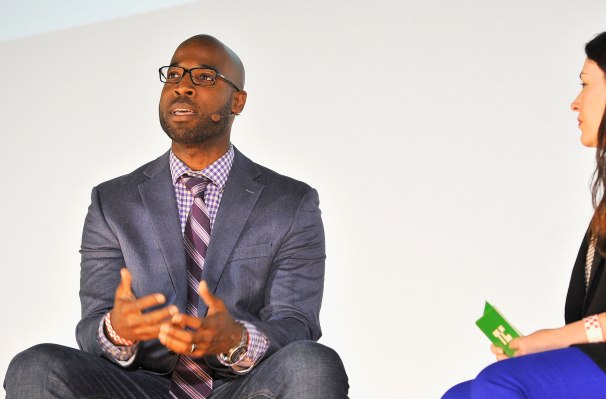On the same day Uber announced it dismissed 20 employees due to harassment claims, the guy in charge of diversity at the company said the latest report was “the first step of many” to improve culture at the company.
“I’m kind of excited to see some progress… I want to make Uber a better and better place to work,” Uber head of global diversity and inclusion Bernard Coleman said at TC Sessions: Justice today.
Coleman joined Uber in January, shortly before former engineer Susan Fowler publicly accused the company of rampant sexual harassment and human resources negligence in a Medium post. That post kicked off a firestorm of negative publicity for Uber and led to multiple investigations into Uber’s human resources operations.
But for Coleman, who was new on the job, the post came at a particularly fraught time. He was and his family were still living in Virginia at the time, he had sold his house and was just about to move across the country when he heard about the blog post.
“I felt terrible for a number of reasons,” Coleman said, noting that he felt helpless in part because he wasn’t physically in San Francisco when those claims were made.
At an all-hands meeting today, Uber released the results of a Perkins Coie LLP investigation into 215 employees accused of harassment. As a result of that probe, about 100 employees have been dismissed from those claims. But 20 were fired, another 57 are still under investigation, 31 are in some type of counseling or training and seven have received a written warning.
A separate investigation is being spearheaded by former US Attorney General Eric Holder and Tammy Albarran, partners at law firm Covington & Burling, to look into the workplace issues Fowler initially brought forward. The Holder report is reportedly in the hands of board members and results of that review are expected to be made public next Tuesday.
Part of the work Uber is doing is training its management team. According to Coleman, 63 percent of Uber management are first-time managers. Those people are going through training to level-set education across the group.
In light of its investigations, Uber is facing an uphill battle in public perception, but it also is working to improve diversity in its workforce. In late March, the company released its first diversity report,
Worldwide, the company is 36.1 percent female and 63.9 percent male, with women making up just 15.4 percent of Uber’s tech workforce. The company is predominantly white, at just under 50 percent. It’s 8.8 percent black, 5.6 percent Latinx and 4.3 percent two more or races in the U.S. In technical roles, those percentages drop to 1 percent, 2.1 percent and 2.4 percent, respectively.
Clearly there’s still work to do. During his session, Coleman said there’s no silver bullet to fixing the diversity and inclusion issues at the company. The good news is that based on his experience, diversity and inclusion (D&I) is not under-resourced at Uber, unlike some other places where he’s worked.
At the same time, Coleman compared working on diversity at a company with 12,000 employees to retrofitting a house. When a company is just getting started, he said, it’s not thinking about what diversity looks like.
“The next thing you know you’re so big and you realize that this is important,” he said.
